Does Khan Academy Teach You Organic Chemistry Well?
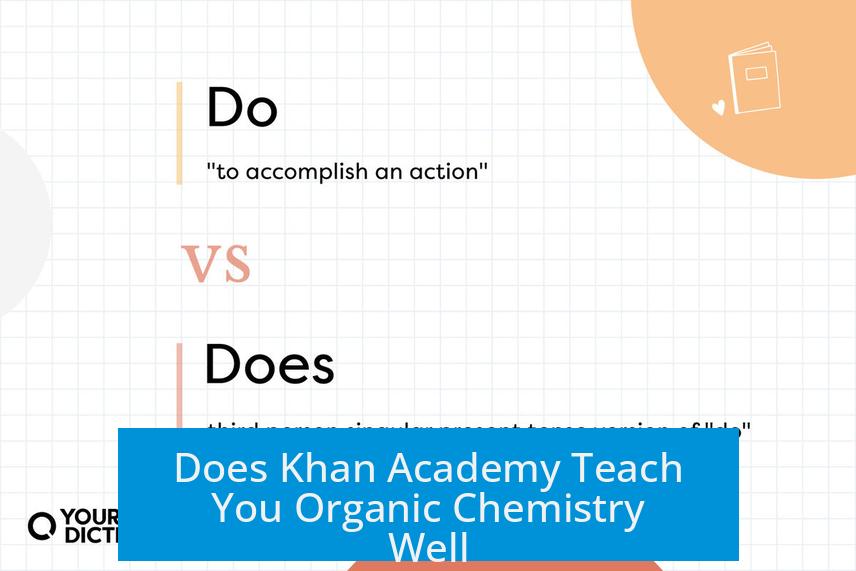
Khan Academy provides a decent introduction to organic chemistry concepts but does not fully suffice as a standalone resource for mastering the subject. It serves better as a supplemental aid rather than a primary teaching tool. Students often find its explanations somewhat slow and limited compared to other available resources.
General Assessment of Khan Academy’s Organic Chemistry Content
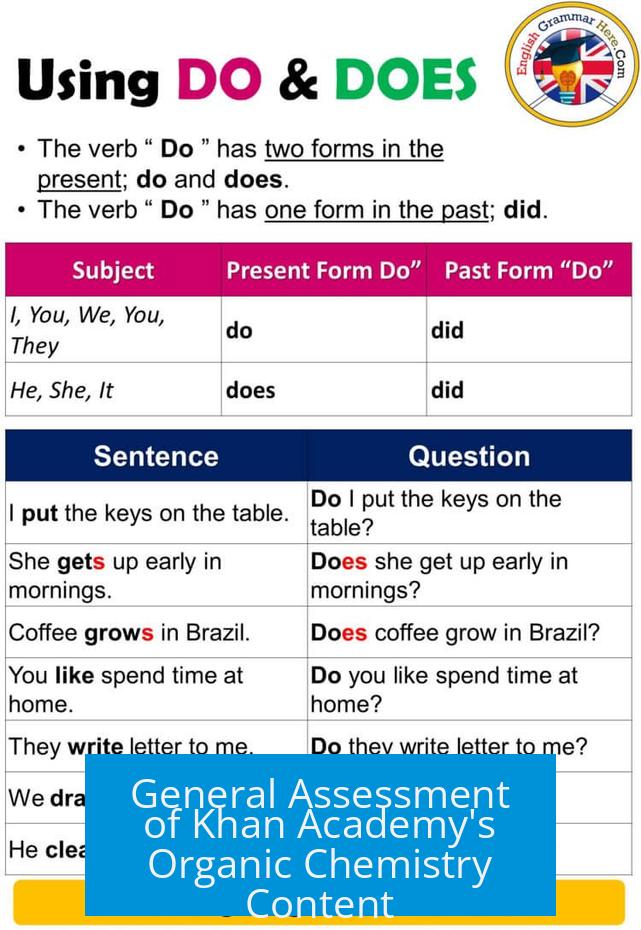
Khan Academy covers a wide range of organic chemistry topics. Its videos give a solid overview of key principles found in typical Organic Chemistry 1 and 2 courses. However, several organic chemistry teaching assistants (TAs) and professors describe Khan’s material as basic and occasionally inaccurate. The depth required for nuanced understanding is frequently missing. For instance, subtleties that instructors emphasize during exams sometimes go unaddressed in Khan’s videos.
Users report that Khan’s pace might feel slow, and the series can seem fragmented. For some, this makes sustained learning inefficient. A common view among students and instructors alike is that Khan Academy helps fill knowledge gaps but does not replace interactive teaching settings or comprehensive textbooks.
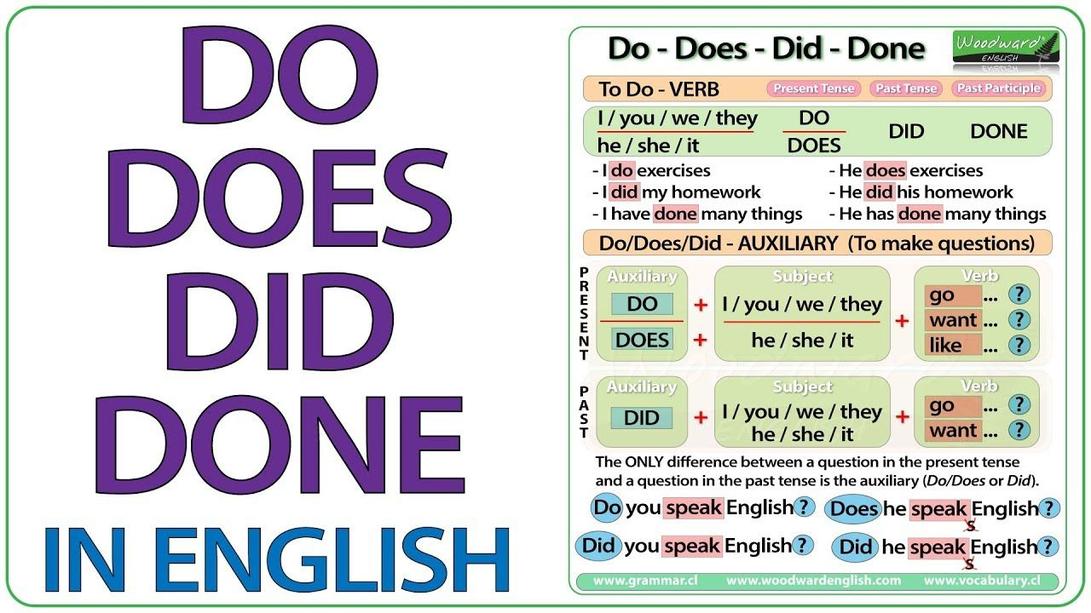
Comparison with Other Resources
- ‘Organic Chemistry Tutor’ on YouTube is highly recommended by students. His videos are detailed and clearer for exam preparation, despite sometimes being long and less organized.
- Leah4Sci is praised for strategies that improve exam speed and application skills.
- MIT OpenCourseWare (MIT OCW) offers excellent introductory organic chemistry lectures with strong academic backing.
- Books like Organic Chemistry as a Second Language by David Klein distill basics effectively.
- Websites such as masterorganicchemistry.com provide quality study sheets and reaction summaries.
While Khan Academy can assist, these alternatives often provide clearer explanations and address more complex ideas and exceptions critical for organic chemistry mastery.
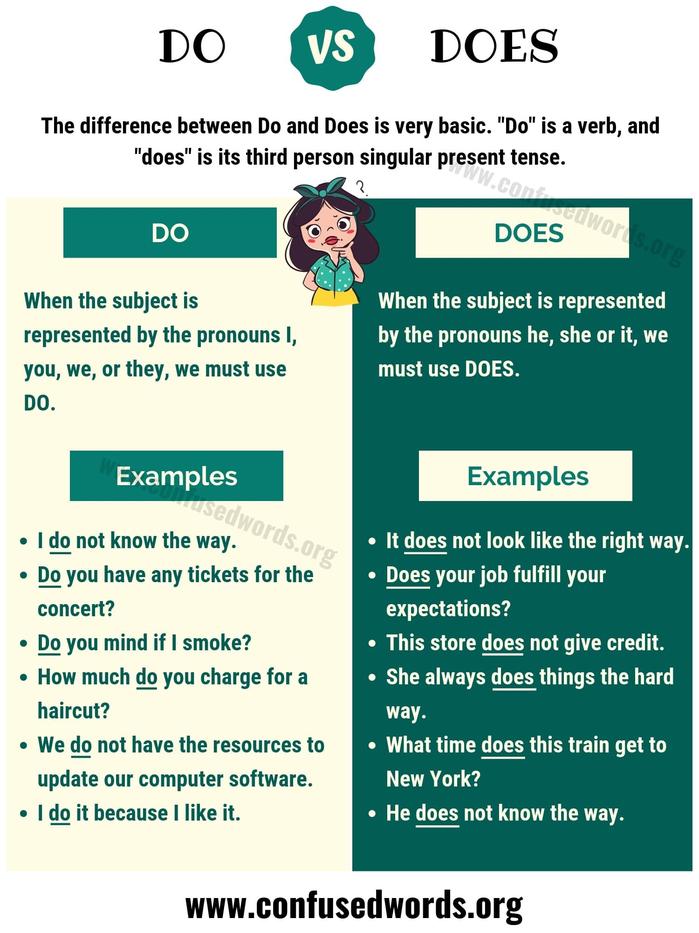
Strengths and Use Cases of Khan Academy
Khan Academy is a free, accessible platform suited for supplementing classroom learning. Students who rely on textbooks for structured study may find its content helpful to reinforce concepts such as reaction mechanisms or stereochemistry. It works well for those who want to casually review difficult sections after class or prior to exams. The platform offers a broad introduction to topics like Markovnikov’s rule, resonance, and functional group reactions.

Students often use Khan Academy to:
- Fill gaps in understanding after classroom lectures
- Practice and reinforce mechanisms and theory
- Review critical concepts without heavy textbook reading
- Explore supplementary videos for difficult topics
Limitations and Critiques
Khan Academy’s organic chemistry videos can lack the depth and rigor needed for a full grasp of the subject. Complex contingencies and exceptions are often glossed over or omitted. Some professors report inaccuracies or oversimplifications in explanations or answers.
Key limitations include:
- Missing detailed discussion on reaction exceptions and nuanced mechanisms
- Occasional factual errors noted by experts
- Videos can be slow-paced, which may frustrate more advanced learners
- Less interactive format limits immediate clarifications or follow-up questions
- Lack of extensive problem-solving practice compared to textbooks and dedicated tutors
Thus, Khan Academy is less effective as a primary course tool but reasonable as an adjunct resource.
Best Practices for Studying Organic Chemistry
Success in organic chemistry tends to rely more on consistent effort and diverse study methods than on any single resource. Recommendations include:
- Complete all textbook practice problems thoroughly.
- Create flashcards for reaction mechanisms and review them daily.
- Develop a master reaction list sorted by product type to recognize patterns.
- Review class notes promptly after lectures and ensure you can explain concepts without them.
- Study regularly — at least one hour daily is ideal.
- Use professor lecture notes and past exams as your primary study aids.
- Combine video supplements like Khan Academy with interactive resources such as discussion groups or tutoring.
Summary and Recommendations
Khan Academy offers free organic chemistry content accessible to a wide audience. It works as a basic introductory tool or for light review. However, the platform does not cover the complexity of organic chemistry fully. Students aiming for strong exam performance should complement Khan with other resources and active study techniques.
| Aspect | Khan Academy | Recommended Alternatives |
|---|---|---|
| Content Depth | Basic overview, lacking depth and nuances | Organic Chemistry Tutor, Leah4Sci, Textbooks |
| Accuracy | Mostly correct but occasional errors | Lecture notes, verified textbooks, academic videos |
| Use Case | Supplement to class or textbook study | Primary learning for detailed study and exam prep |
| Interactivity | Non-interactive videos | Live classes, tutoring, online forums |
| Cost | Free | Mostly free or affordable online resources |
Key Takeaways
- Khan Academy is a helpful but limited organic chemistry resource.
- Its videos provide good basic explanations but miss many course nuances.
- More detailed resources like ‘Organic Chemistry Tutor’ enhance understanding.
- Active study, including problem-solving and flashcards, is essential.
- Use Khan Academy as a supplement, not the sole learning platform.
Does Khan Academy Teach You Orgo Well? Let’s Break It Down
Short answer: Khan Academy does NOT teach organic chemistry (orgo) well enough to rely on as your main resource. It’s decent as a supplementary tool, but if you want to truly grasp the twists and turns of orgo reactions and mechanisms, you’ll want to look elsewhere—or at least combine it with stronger materials. Why? Because organic chemistry is tricky, nuanced, and needs more than just surface-level videos. Let’s unpack that with some fresh insights, real experiences, and handy tips.
What’s the General Take on Khan Academy for Orgo?
Khan Academy, the educational giant known for math and science, has a decent collection of organic chemistry videos. They touch on most foundational topics covered in Org 1 and Org 2 courses. You’ll find content explaining Markovnikov’s rule, nucleophilic substitutions, and the like.
But many students and even professors find the Khan experience a little underwhelming. Here’s why: The videos tend to move slowly, covering the “gist” without diving deeply into complicated exceptions or detailed nuances. Organic chemistry is full of “what ifs” and subtle changes in reactions, and that’s what makes the subject both challenging and fascinating. Khan Academy videos often skim over these complexities, which might leave you scratching your head during exams or problem-solving.
For example, one organic chemistry TA said that they weren’t “super impressed” with Khan Academy because it misses many of the finer points their professors emphasize. Another professor recommended avoiding Khan altogether, pointing out that some answers in their videos are sometimes inaccurate. Ouch.
So, if you’re looking for a thorough, classroom-quality, interactive experience, Khan Academy alone probably won’t cut it.
Who Finds Khan Academy Useful, Then?
Khan Academy shines best as a supplemental tool. For a student who attends lectures, takes notes, and tackles practice problems, Khan videos can act like extra mini-tutors clarifying confusion over specific topics.
Say you’re stuck on the difference between Markovnikov and anti-Markovnikov additions. A quick Khan video might cement your understanding or provide a different explanation than your professor gave. Many viewers appreciate its clear, straightforward style when drilling particular principles.
One self-taught student credits Khan Academy alongside other resources for helping them improve from a C+ in general chemistry to a B+ in Organic I and an A- in Organic II. This goes to show that Khan is far from useless—it’s just not the heavy hitter some might need.
Also, Khan’s free access is a blessing. If you’re broke (aren’t we all?), studying orgo with no cost involved is definitely a plus. Trying it for a few minutes is risk-free—you might learn something useful or realize quickly it’s not for you and move on.
But If You Want More Depth and Better Quality…
Here’s the scoop: many students rave about alternatives. The “Organic Chemistry Tutor” YouTube channel repeatedly surfaces in recommendations. People generally say it’s “wayyy better” because the instructor dives deeper, covers more topics, and explains with detail and examples.
Yet beware, Organic Chemistry Tutor videos can sometimes be lengthy and feel a bit disorganized. But if you can stay focused, that little extra challenge might be worth it.
Other great resources worth checking out include:
- Leah4Sci: She offers exam tips and speed strategies, which is KEY to managing your time during tricky tests where the clock’s your enemy.
- MIT OpenCourseWare (OCW): Their introductory orgo lectures bring Ivy League credibility.
- Books like Organic Chemistry as a Second Language by David Klein: A concise, understandable TL;DR resource perfect for building basics efficiently.
- Master Organic Chemistry: Famous for clear explanations and excellent study sheets.
- Professor Dave Explains: Good for straightforward, engaging scientific presentations.
Honestly, it’s best to mix and match a few of these depending on your learning style and the topic you’re tackling.
Why Khan Academy Falls Short Alone
Let’s talk nuances. Orgo isn’t just cut-and-dry rules. Many reactions have “ifs,” unexpected stereochemistry outcomes, strange exceptions, and mechanistic quirks. These usually need a teacher’s guidance, follow-up questions, and maybe some chalkboard magic to clarify.
Khan Academy’s format doesn’t easily support that. Their approach is to explain one concept at a time in short videos, which is great for some topics but leaves gaps in complex areas. For example, details on how subtle electronic effects influence reaction pathways often get glossed over.
Plus, the pace can sometimes be frustratingly slow or repetitive if you already understand basics, and too shallow if you need deep diving. For many learners, this results in needing to hunt down other materials anyway, which might as well be your first choice.
Practical Tips If You Use Khan Academy for Orgo
So you’re still thinking about using Khan. Fine. Here’s how to get the most from it:
- Start with your professor’s lecture notes. Your exam will likely focus on what they emphasize.
- Watch Khan videos to supplement your weak spots. For example, if you struggle with electrophilic aromatic substitution, search Khan first.
- Avoid spending time on memorizing nomenclature with Khan. Many students find acid/base and naming videos tedious and hard to retain. Save that for later or try flashcards.
- Do every practice problem in your textbook. Theory without practice is like a bicycle without wheels—pointless.
- Make flashcards for mechanisms and review daily. Drill, drill, drill those reaction steps.
- Consider creating a “master reaction list.” Organize mechanisms by product class to see patterns.
- Study consistently—at least an hour a day. Orgo is a marathon, not a sprint.
If you mix Khan videos with these strategies, your orgo grades just might improve significantly.
Final Thoughts: Work Ethic and Resourcefulness Matter Most
At the end of the day, your success in organic chemistry hinges more on your effort and study habits than any single video series. Khan Academy is free and decent for clarifying concepts here and there. But it’s not the silver bullet for mastering organic chemistry.
If you want to get organic chemistry “down,” you need to build a toolkit. This includes your professor’s lectures, a solid textbook, dependable video tutorials like Organic Chemistry Tutor, hands-on problems, flashcards, and alternative resources like Leah4Sci or MIT OCW.
As a tough subject loved by very few but dreaded by many, organic chemistry rewards consistent work and varied learning methods. Khan Academy can be one small cog in that machine—but don’t rely on it alone or expect to ace your exams with just a few videos.
So, Does Khan Academy Teach You Orgo Well?
It’s a no for standalone learning, but a yes as a helpful supplement. Khan Academy provides a reliable baseline introduction to organic chemistry basics with clear and free videos. For entry-level learners or occasional review, Khan is fine. But to conquer orgo, you’ll want to look past Khan Academy to more focused, detailed, and interactive teaching tools.
Feeling overwhelmed already? That’s normal. But remember, it’s not magic—it’s effort, smart studying, and using the right resources. Try Khan Academy for free, but keep your eyes open for stronger helpers. Because when it comes to organic chemistry, you want ALL the help you can get.
Does Khan Academy provide enough depth for organic chemistry studies?
Khan Academy covers the basic concepts well but often misses detailed nuances needed for higher-level understanding. Some complex topics may not be fully explained. It works best as a supplementary resource.
How does Khan Academy compare to other organic chemistry resources?
Many students find ‘The Organic Chemistry Tutor’ on YouTube more thorough and clear. Other sources like MIT OCW and Leah4Sci also offer better exam strategies. Khan Academy is usually less detailed.
Is Khan Academy reliable in terms of accuracy for organic chemistry?
Some professors have noted occasional errors in Khan Academy videos. It is advisable to cross-check key points with textbooks or professor notes to avoid misunderstandings.
Can Khan Academy alone prepare me for an organic chemistry exam?
Relying solely on Khan Academy is not recommended. Combining it with practice problems, lecture notes, and other resources yields better results. Consistent study and active practice are necessary.
Who benefits most from using Khan Academy for organic chemistry?
Students seeking a quick overview or supplemental explanations may benefit. Those who prefer textbook learning or need in-depth instruction may find it insufficient by itself.


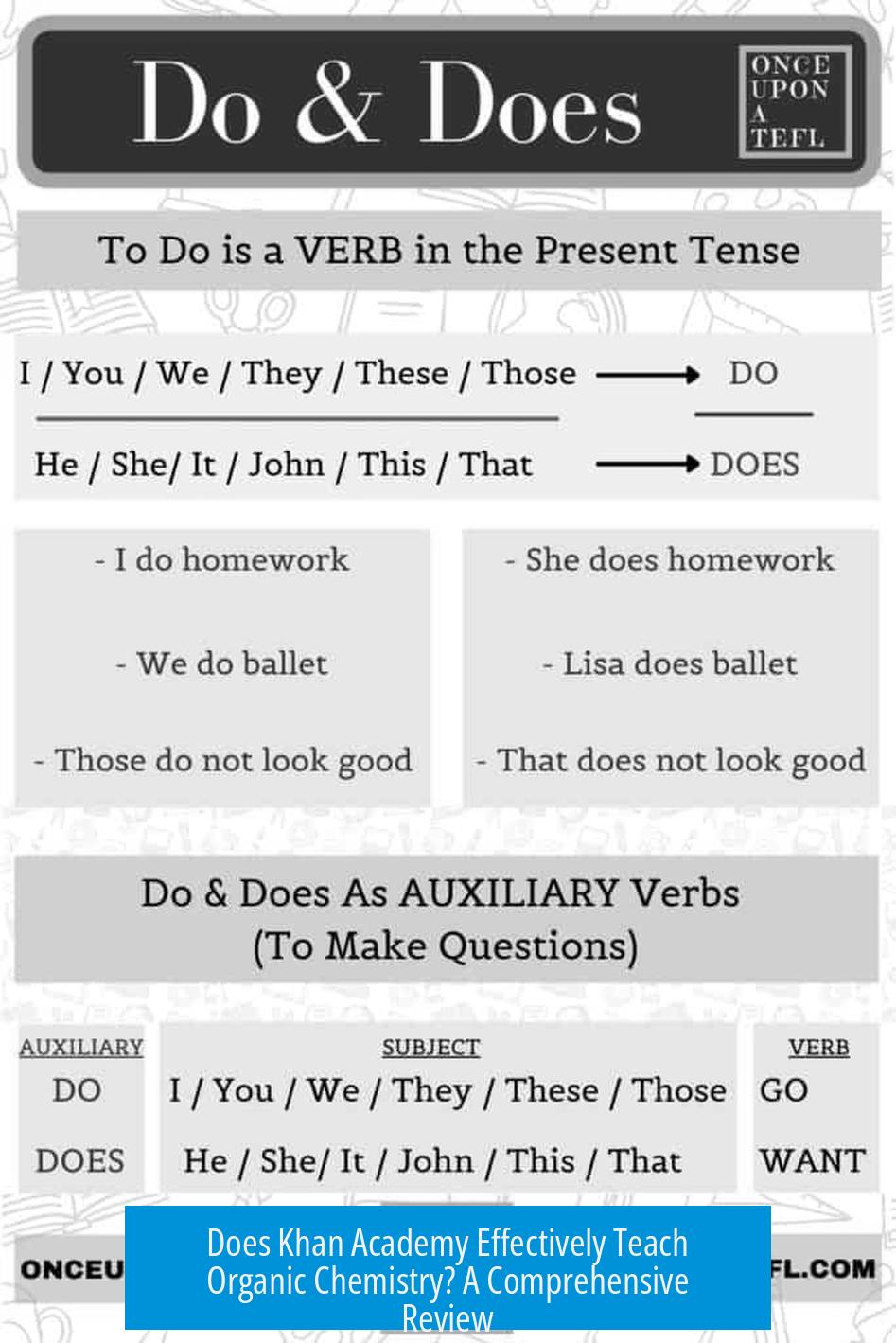


Leave a Comment